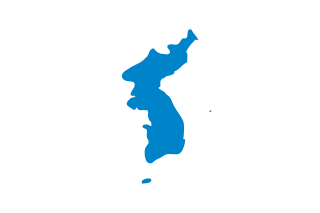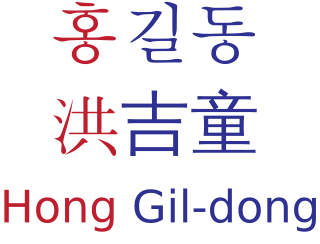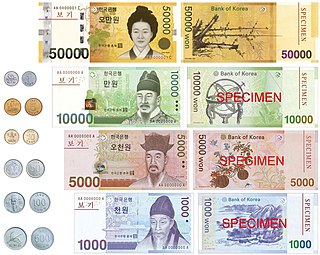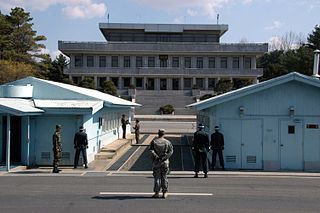
Korea is a peninsular region in East Asia. Since 1945, it has been divided at or near the 38th parallel, now known as the Korean Demilitarized Zone. In 1948, two states declared independence, both claiming sovereignty over all of Korea: South Korea comprising its southern half and North Korea comprising its northern half. The region consists of the Korean Peninsula, Jeju Island, and minor islands near the peninsula. The peninsula is bordered by China to the north and Russia to the northeast, across the Amnok and Duman rivers. It is separated from Japan to the southeast by the Korea Strait.

Korean is the native language for about 81 million people, mostly of Korean descent. It is the official and national language of both North Korea and South Korea. The language has notable differences in each of the Koreas, in part owing to different official standardizations of the language. They are still largely mutually intelligible, however. South Korean newspaper Daily NK has claimed North Korea criminalizes the use of the South's standard language with the death penalty, and South Korean education and media often portray the North's language as alien and uncomfortable.

The Korean War was fought between North Korea and South Korea from 1950 to 1953. It began on 25 June 1950 when North Korea invaded South Korea and ceased after an armistice on 27 July 1953. The north was supported by China and the Soviet Union while the south was supported by United Nations (UN) forces led by the United States.

North Korea, officially the Democratic People's Republic of Korea (DPRK), is a country in East Asia. It constitutes the northern half of the Korean Peninsula and borders China and Russia to the north at the Yalu (Amnok) and Tumen rivers, and South Korea to the south at the Korean Demilitarized Zone. The country's western border is formed by the Yellow Sea, while its eastern border is defined by the Sea of Japan. North Korea, like its southern counterpart, claims to be the legitimate government of the entire peninsula and adjacent islands. Pyongyang is the capital and largest city.

South Korea, officially the Republic of Korea (ROK), is a country in East Asia. It constitutes the southern part of the Korean Peninsula and borders North Korea along the Korean Demilitarized Zone; though it also claims the land border with China and Russia. The country's western border is formed by the Yellow Sea, while its eastern border is defined by the Sea of Japan. South Korea claims to be the sole legitimate government of the entire peninsula and adjacent islands. It has a population of 51.96 million, of which roughly half live in the Seoul Capital Area, the ninth most populous metropolitan area in the world. Other major cities include Incheon, Busan, and Daegu.

Busan, officially Busan Metropolitan City, is South Korea's second most populous city after Seoul, with a population of over 3.4 million inhabitants as of 2017. Formerly romanized as Pusan, it is the economic, cultural and educational center of southeastern South Korea, with its port being South Korea's busiest and the sixth-busiest in the world. The surrounding "Southeastern Maritime Industrial Region" is South Korea's largest industrial area. The large volumes of port traffic and urban population in excess of 1 million make Busan a Large-Port metropolis using the Southampton System of Port-City classification.

A Korean name in the modern era typically consists of a surname followed by a given name, with no middle names. A number of Korean terms for names exist. For full names, seongmyeong, seongham, or ireum (이름) are commonly used. When a Korean name is written in Hangul, there is no space between the surname and the given name.

Kimchi is a traditional Korean side dish (banchan) consisting of salted and fermented vegetables, most often napa cabbage or Korean radish. A wide selection of seasonings are used, including gochugaru, spring onions, garlic, ginger, and jeotgal, etc. Kimchi is also used in a variety of soups and stews. Kimchi is a staple food in Korean cuisine and is eaten as a side dish with almost every Korean meal.

The South Korean won is the official currency of South Korea. A single won is divided into 100 jeon, the monetary subunit. The jeon is no longer used for everyday transactions, and it appears only in foreign exchange rates. The currency is issued by the Bank of Korea, based in the capital city of Seoul.

The division of Korea began on August 15, 1945 when the official announcement of the surrender of Japan was released, thus ending the Pacific Theater of World War II. During the war, the Allied leaders had already been considering the question of Korea's future following Japan's eventual surrender in the war. The leaders reached an understanding that Korea would be liberated from Japan but would be placed under an international trusteeship until the Koreans would be deemed ready for self-rule. In the last days of the war, the United States proposed dividing the Korean peninsula into two occupation zones with the 38th parallel as the dividing line. The Soviets accepted their proposal and agreed to divide Korea.

The Korean Demilitarized Zone is a strip of land running across the Korean Peninsula near the 38th parallel north. The demilitarized zone (DMZ) is a border barrier that divides the peninsula roughly in half. It was established to serve as a buffer zone between the countries of North Korea and South Korea under the provisions of the Korean Armistice Agreement in 1953, an agreement between North Korea, China, and the United Nations Command.

From 1910 to 1945, Korea was ruled as a part of the Empire of Japan under the name Chōsen (朝鮮), the Japanese reading of Joseon.

K-pop, short for Korean popular music, is a form of popular music originating in South Korea as part of South Korean culture. It includes styles and genres from around the world, such as pop, hip hop, R&B, rock, jazz, gospel, reggae, electronic dance, folk, country, disco, and classical on top of its traditional Korean music roots. The term "K-pop" became popular in the 2000s, especially in the international context. The Korean term for domestic pop music is gayo, which is still widely used within South Korea. While "K-pop" can refer to all popular music or pop music from South Korea, it is colloquially often used in a narrower sense for any Korean music and artists associated with the entertainment and idol industry in the country, regardless of the genre.

The South Korea national football team represents South Korea in men's international football and is governed by the Korea Football Association. South Korea has emerged as a major football power in Asia since the 1980s, having participated in ten consecutive and eleven overall FIFA World Cup tournaments, the most for any Asian country. Despite initially going through five World Cup tournaments without winning a match, South Korea became the first Asian team to reach the semi-finals when they co-hosted the 2002 tournament with Japan. South Korea also won two AFC Asian Cup titles, and finished as runners-up on four occasions. Furthermore, the team won three gold medals and three silver medals at the senior Asian Games.
Korean drama, also known as Koreanovela or K-drama, refers to Korean-language television shows made in South Korea. These shows began to be produced around the early 1960s, but were mostly consumed domestically until the rise of the Korean Wave in the 1990s. They have since achieved significant international popularity, with dozens of millions of viewers across the world.

Kim Jong Un is a North Korean politician who has been supreme leader of North Korea since 2011 and the leader of the Workers' Party of Korea (WPK) since 2012. He is the third son of Kim Jong Il, who was North Korea's second supreme leader from 1994 until his death in 2011, and Ko Yong Hui. He is a grandson of Kim Il Sung, who was the founder and first supreme leader of North Korea from its establishment in 1948 until his death in 1994.

Seoul, officially Seoul Special City, and formerly known as Hanseong and Keijō, is the capital of the Republic of Korea (ROK), commonly known as South Korea, and the country's most extensive urban center. The broader Seoul Capital Area, encompassing Gyeonggi province and Incheon metropolitan city, emerged as the world's fourth largest metropolitan economy in 2014, trailing only Tokyo, New York City, and Los Angeles, hosting more than half of South Korea's population. Although Seoul's population peaked at slightly over 10 million, it has gradually decreased since 2014, standing at approximately 9.97 million residents as of 2020. Seoul is the seat of the South Korean government.

BTS, also known as the Bangtan Boys, is a South Korean boy band formed in 2010. The band consists of Jin, Suga, J-Hope, RM, Jimin, V, and Jungkook, who co-write or co-produce much of their material. Originally a hip hop group, they expanded their musical style to incorporate a wide range of genres, while their lyrics have focused on subjects including mental health, the troubles of school-age youth and coming of age, loss, the journey towards self-love, individualism, and the consequences of fame and recognition. Their discography and adjacent work has also referenced literature, philosophy and psychology, and includes an alternate universe storyline.

The Korean alphabet, known as Hangul in South Korea and Chosŏn'gŭl (조선글) in North Korea, is the modern official writing system for the Korean language. The letters for the five basic consonants reflect the shape of the speech organs used to pronounce them, and they are systematically modified to indicate phonetic features; similarly, the vowel letters are systematically modified for related sounds, making Hangul a featural writing system. It has been described as a syllabic alphabet as it combines the features of alphabetic and syllabic writing systems.

Samsung Group is a South Korean multinational manufacturing conglomerate headquartered in Samsung Digital City, Suwon, South Korea. It comprises numerous affiliated businesses, most of them united under the Samsung brand, and is the largest South Korean chaebol. As of 2020, Samsung has the eighth-highest global brand value.


















